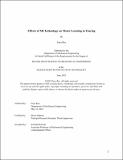Effects of XR Technology on Motor Learning in Fencing
Author(s)
Ryu, Enya
DownloadThesis PDF (1.561Mb)
Advisor
Anthony, Brian
Terms of use
Metadata
Show full item recordAbstract
Increasing benefits of utilizing immersive training environments for sports like basketball and baseball inspired a fencing coach to inquire its role in enhancing traditional coaching methods. This study investigates the potential of immersive training environments in augmenting traditional fencing pedagogy, which commonly involves mimicry of in-person mentors or videos and practice through recollection. Thirty participants with no prior fencing experience were taught the advance-jump-lunge sequence in various extended reality environments, using two common coaching styles: teaching individual sequence elements first and teaching the complete movement before its deconstruction. Initial findings suggest that subjects who learned individual components first generally demonstrated higher learning levels, supporting the part-task training strategy in fencing instruction, although no significant influence of learning environment type on learning levels was observed. This study provides valuable insights into fencing pedagogy and offers a roadmap for future research, which may include a detailed investigation of kinematic properties or additional data collection to track long-term effects and the learning trajectory of alternate movements.
Date issued
2023-06Department
Massachusetts Institute of Technology. Department of Mechanical EngineeringPublisher
Massachusetts Institute of Technology